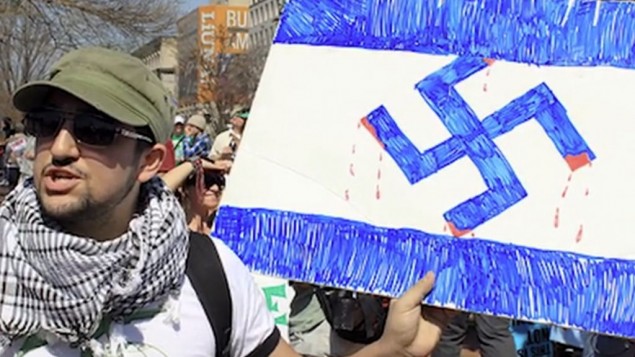The City University of New York in Brooklyn, Northwestern University and many of the schools in the University of California system are among the most hostile campuses for Jewish students, with high rates of anti-Semitic harassment and anti-Israel activity, researchers have found.
According to a major new study at Brandeis University into anti-Semitism and anti-Israel sentiment on US campuses, these universities are “hotspots” for such activity.
The study, released this month, was conducted by researchers at the Maurice and Marilyn Cohen Center for Modern Jewish Studies and was based on findings from a survey taken in the Spring of 2016 among Jewish undergraduate students at 50 US campuses. All the students selected for the study were US applicants to the Birthright-Israel program, whether they attended the free 10-day trip to Israel or not. Of the more than 19,000 surveys send out to the Birthright applicants, 4,010 were completed which provided the basis for the study.
According to the report, the campuses were not selected randomly, “but were purposely sampled based on the estimated size of the campus Jewish population, geographic diversity, public/private status, selectivity, and prior evidence of high levels of anti-Israel hostility or anti-Semitism.”
At the university campuses labeled hotspots, a majority of the Jewish students surveyed said that they “perceive a hostile environment toward Israel,” with one-quarter saying they felt “a general environment of hostility toward Jews” on their respective campuses.
The report found that the high rates of anti-Semitic harassment and hostility at these campuses “are largely driven by hostility toward Israel.”
On other US university campuses, including Wisconsin, Rutgers and Illinois, hostility and anti-Semitic harassment were found to be high but were not strongly connected to criticism of Israel, the report found; rather, “at these schools, more traditional anti-Semitic stereotypes and tropes, rather than criticism of Israel’s politics, seem to be driving the perceived hostility toward Jews.”
The report cited another study this year by the AMCHA initiative this year, which tracks and investigated anti-Semitic incidents on US campuses, and which found that “57 percent of the 113 US schools [surveyed] with the largest proportions of Jewish undergraduates had incidents involving the targeting of Jewish students for harm, anti-Semitic expression, or BDS activity.”
One of the strongest predictors of a perceived hostile environment toward Jews and Israel on campus, according to the Brandeis study, “is the presence of an active Students for Justice in Palestine (SJP) group.”
A junior at Rutgers university surveyed for the study told of an incident involving the SJP during Israel Apartheid Week on US campuses.
Members of the SJP “stood in front of the dining hall wearing white shirts with red ‘blood’ spatter across from them. They had signs saying ‘this is what the Jews did to us.’ I felt extremely harassed; even though it was not personally to me, when I stood there I saw complete hatred that they had to all of the Jews walking by. There were even some people, a part of SJP, shouting profanities and giving the middle finger to the Jews that were just standing next to them.”
Another junior at Northeastern University said campus life became “unsafe” when “a group on campus put eviction notices on the dorm room doors of Jewish people.” The incident, and other like it, was reported in the press to be the work of SJP members.
Other incidents related to general anti-Semitism: a student at Ohio State University said that while living in a dorm, he or she once “opened my door to my next-door neighbor drawing a swastika on my door.”
According to the study, about 75% of those surveyed reported hearing hostile remarks toward Israel and over 20% reported “being blamed for Israel’s actions because they are Jewish.”
Around one-third of the respondents reported witnessing “some form of anti-Semitic harassment, often Israel related.”
At the University of Illinois and the University of Texas, 22% of respondents said they had been the target of a personal anti-Semitic attack or harassment. Almost 30% of those surveyed in the California university systems said they were personally the target of witness an anti-Semitic attack, with 40% saying they witnessed an attack on social media.
A majority of the hostility or attacks emanated from other students, according to the study, with a not insignificant proportion coming from the faculty and other campus staff.
The study also documented students’ personal feelings about speaking up on Israel or the Israeli-Palestinian conflict on campus and the effect of their experiences on their connection to Israel.


